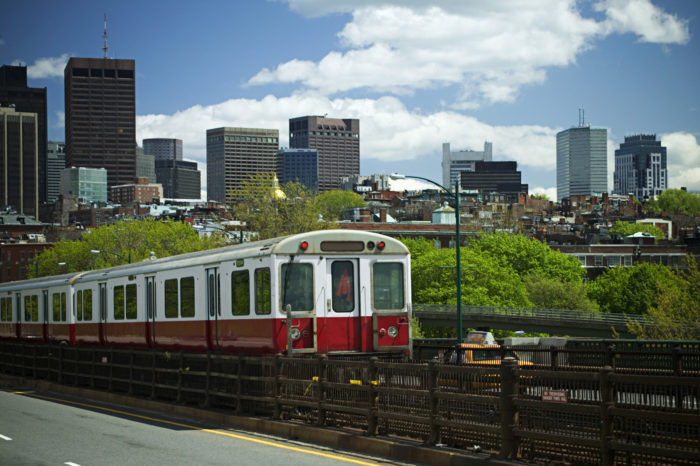Driving Reform: New Study on Real Solutions to Our Transportation Challenges
STUDY: TIE NEW FUNDING TO PERFORMANCE, IMPLEMENTATION OF TRANSPORTATION REFORM
Phasing in additional money based on MassDOT performance will improve service
Massachusetts’ aging transportation infrastructure needs about $2.6 billion in new investment over six years that would come in stages based on the Massachusetts Department of Transportation’s (MassDOT’s) performance on a series of publicly accessible metrics and implementation of reforms included in a 2009 state transportation law and earlier legislation, according to a new Policy Brief published by Pioneer Institute.
In “Driving Reform: Real Solutions to Our Transportation Challenges,” Pioneer Senior Fellow Charles Chieppo and Executive Director James Stergios recommend that the new funding be evenly split between gas tax hikes and fare increases on one hand, and money freed up by the implementation of 2009 and other reforms and recapturing transportation revenue currently being used for other purposes.
Driving Reform: Real Solutions to Our Transportation Challenges
“The wisest use of the new money is to phase it in over time, as we did with the 1993 Education Reform Act,” said Stergios. “That way, we can hold the agencies accountable for delivering on promised reforms, learn from successes and failures, and adjust as we move ahead. It’s far more important to do transportation reform right than to do it fast.”
Under the plan, the state gas tax would immediately rise by three cents and would rise an additional three cents in 2016 if MassDOT meets a benchmark based on publicly available customer service metrics and implementation of the 2009 and other reforms.
New revenue would be generated by MBTA fare hikes that are part of a strategy to increase the percentage of operating costs covered by fare revenue from 40 to 45 percent. Even once the 45 percent goal is achieved, the T’s farebox recovery ratio would still be below those of the Bay Area Rapid Transit system, Washington. D.C. and New York City. No environmental or legislative approval would be required for fare increases aimed at achieving the 45 percent revenue recovery goal.
Pioneer calls for all new transportation-based tax, fee and fare revenue be used exclusively for transportation purposes.
The 2009 transportation reform law was passed amid promises that it would save $6.5 billion over 20 years, but actual savings have thus far been a tiny fraction of that amount because much of the law is yet to be implemented. Provisions that should be implemented include development of performance and asset management systems, modeling the cost of a project over its lifecycle and ending the practice of paying operating employees out of the capital budget.
The Pioneer proposal would reduce the number of MassDOT employees paid out of capital by 75 percent over five years, which would mean moving about 285 employees to the operating budget each year. Over 20 years, the annual cost of paying an employee earning $75,000 out of the capital budget is about $150,000.
In return for the initial three-cent gas tax hike, MassDOT will have to focus on re-establishing management rights such as the ability to outsource and control employee assignments, which in the 1990s saved the MBTA about $50 million annually before many of them were eliminated.
MassDOT must also develop and post a clear set of customer-focused metrics that will provide the basis for decisions about funding future transportation needs. Data for these metrics are already collected by MassDOT because of federal requirements.
Other sources of new revenue include redirecting $30-$50 million in annual savings achieved by moving to automated toll collection, recapturing about $40 million in gas tax revenue dedicated to underground storage tank removal, which is currently being diverted to non-transportation purposes. Finally, the plan recommends seeking $10 million in new revenue from new electronic tolling mechanisms.
Finally, Pioneer recommends that no major transportation expansion projects be undertaken beyond those already required by law until road, bridge and transit maintenance backlogs have been eliminated.
And the Institute calls for all transportation infrastructure funding decisions to be based on a project’s lifecycle costs, including operating and maintenance expenses, rather than just construction costs. To ensure statewide consensus on the strategic value of major investments, projects with lifecycle costs of $1 billion or more must be approved by both houses of the state Legislature.
The Pioneer Plan seeks to correct many shortcomings of Governor Patrick’s transportation proposal, such as its overstatement of the economic benefits of proposed expansions, its failure to consider the negative multiplier effects of new taxes, its understatement of construction expenses and its lack of accounting for the cost of operating and maintaining new projects. But it also seeks a way to make constructive progress toward a transportation system that supports the needs of people and future economic development.
“I applaud Governor Patrick’s focus on transportation,” Chieppo said. “But his proposal is eerily reminiscent of the policies that got us into the mess we’re in today. Pioneer’s plan is a responsible, substantial and logical next step after the 2009 transportation reform law.”
Pioneer Institute is an independent, non-partisan, privately funded research organization that seeks to improve the quality of life in Massachusetts through civic discourse and intellectually rigorous, data-driven public policy solutions based on free market principles, individual liberty and responsibility, and the ideal of effective, limited and accountable government.
[wpdm_category id=transportation item_per_page=10]


